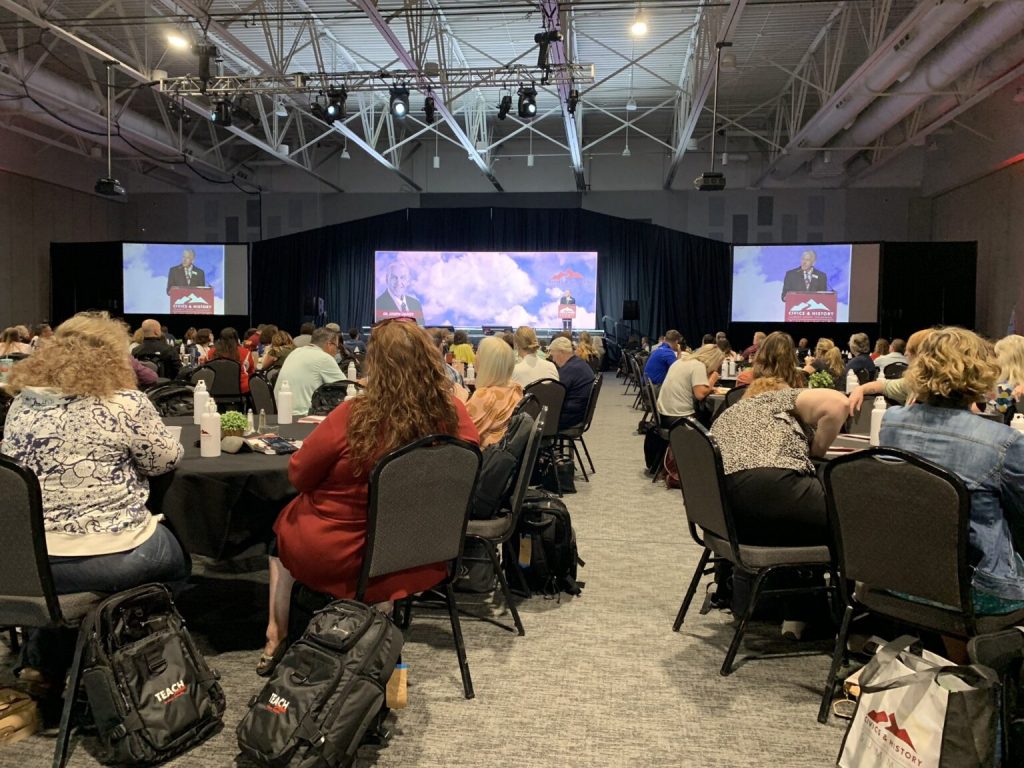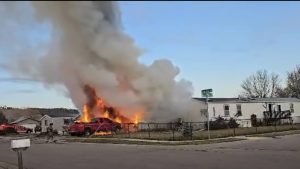South Dakota officials said history road trips and summits would help educators prepare to teach an extensive and controversial overhaul of state social studies standards.
But months before the new standards will be implemented in schools, the events are canceled due to federal funding cuts. Other summer programs for students and educators are suspended, including career exploration camps for middle schoolers that were expected to serve 600 students.
State Education Department officials did not say whether the suspended programs will be reinstated at a later date. Department spokeswoman Nancy Van Der Weide said the department will work to balance fiscal responsibility with “our equally important priority of providing South Dakota’s K-12 students with the best educational opportunities available.”
States and school districts can resubmit requests for the federal funding, which was provided as pandemic relief and then extended by the Biden administration. But the projects will be more strictly reevaluated by the Trump administration based on how they address the effects of COVID-19 on students, according to the federal Department of Education. The state has not told South Dakota Searchlight if the department plans to reapply.
East Dakota Educational Cooperative contracted with the state to organize the Civics and History Summit and History Road Trip. The state used federal funds to pay for the events each of the past two years, but the federal Department of Education canceled $2.8 million in funding to pay for this year’s events.
Sisseton School District Superintendent Tammy Meyer said students and teachers in her district have participated in the programs in the past.
“I’ve seen the excitement of staff to attend the summit and road trips to bring back those experiences and to teach their students what they’ve learned. I’ve seen the impact of these career summer camps on students,” Meyer said. “It’s unfortunate the staff and students who anticipated attending those may not have those opportunities this summer.”
Feds cut funding because extensions were ‘not justified’
As of April 7, Trump administration funding cuts affecting South Dakota’s state government totaled nearly $10 million. More than half of those cuts — over $5 million — have impacted the state Department of Education.
U.S. Education Secretary Linda McMahon notified state education departments in a March 28 letter that COVID-19 federal relief funds would expire that day, instead of in March 2026. The change impacts the final payouts of the American Rescue Plan Act’s Elementary and Secondary School Emergency Relief (ESSER) Fund.
Congress approved $189.5 billion in ESSER funding during the pandemic to help schools recover from pandemic setbacks and expenses.
South Dakota was awarded $593.4 million, according to the federal pandemic oversight website. The funds were intended for the state department and individual school districts. The awards’ obligation deadline was set for the end of September 2024, but some entities, including the state department, requested extensions to spend remaining funds. Extensions were granted by the Biden administration, until they were recently revoked by the Trump administration.
McMahon said in the letter that an extension to spend remaining funds “was not justified.”
“Extending deadlines for COVID-related grants, which are in fact taxpayer funds, years after the COVID pandemic ended is not consistent with the Department’s priorities and thus not a worthwhile exercise of its discretion,” McMahon wrote.
Schools could spend the funds on programs and improvements to address student needs, including summer classes, extended programs, educational software, mental health services, indoor air quality improvements and building renovations. All projects were subject to approval by the state Education Department.
Three South Dakota school districts were impacted by the loss of extended funds. Sisseton lost $448,071, Iroquois lost $69,662, and Armour lost $9,061, according to the Bureau of Finance and Management.
Sisseton was awarded a total of $11.7 million in ESSER funds over its three phases, using the money to renovate its high school building and classrooms, replace its roof, and purchase school buses and student laptops, among other programs and improvements, Meyer said. Some of its lost funding was due to unused funds, but about $319,000 was renovation spending that had yet to be reimbursed.
Meyer said she’s working with the state department to resubmit its extension request. Otherwise, the $319,000 will have to come out of the district’s own budget, which might cause a postponement other projects.
“It’s late in the budget year,” Meyer said, “so a lot of our projects have already been assigned and established for this budget.”
Beyond the history summit and road trip, another $2.37 million in extended funding would have supported middle school career summer camps, mentoring academies for teachers and a state website listing open teaching positions in the state. The Associated School Boards of South Dakota also hosts a website for educator openings.
According to the South Dakota Board of Regents, the Dakota Dreams summer career exploration camps served 1,800 middle school students between 2023 and 2024. Another 600 students were expected to attend camps this summer in nursing, health sciences, education, law enforcement, cyber operations, computer science, engineering and more.
The state’s teacher apprenticeship pathway, which allows paraprofessionals to earn a teaching degree for a reduced rate while working full time, lost $58,178 in federal funding. The state Jobs for America’s Graduates program, which helps struggling middle and high school students complete their education, lost $88,414. The state Department of Education hasn’t responded to questions about the fate of the two programs.
Social studies standards implications
The South Dakota Board of Education Standards approved social studies standards changes in 2023 after almost two years of controversy over their age appropriateness, feasibility and the scope of Native American history included.
Shortly after, then-Gov. Kristi Noem and South Dakota Department of Education Secretary Joe Graves said students “will be taught the best social studies education in the country” and be equipped “with the solid grounding in history and civics they need to exercise their role as citizens.”
“The department stands ready to support that implementation with professional development and standards-aligned resources,” Graves said at the time.
Rob Monson, executive director of School Administrators of South Dakota, said educators “were counting” on the professional development opportunities this summer.
“A lot of districts were looking forward to having conversations at the history summit and road trip locations to get clarity on the new standards,” Monson said. “It’s unfortunate for those who would attend and those who would benefit.”
The civics and history event cancellations won’t affect the social studies standards implementation this fall, Van Der Weide said.
“We’ve successfully hosted these programs within the past two years and continue to offer implementation support for our educators,” she said, adding that the department provides standards-aligned books and resources along with a weekly social studies curriculum to South Dakota classrooms.
Dismantled federal Education Department won’t negatively impact SD, secretary says
The funding cuts compound existing worries public school advocates have surrounding the uncertainty of education funding. President Donald Trump signed an executive order in March directing McMahon to dismantle her department and “return education authority to the states.” The move followed a 50% reduction in department staff.
In an interview with South Dakota Searchlight, Graves said he doesn’t see the move to dismantle the federal Department of Education “negatively impacting South Dakota.”
“I think some people have had some real concerns about what’s going on at the federal level,” Graves said. “The truth is, I don’t see it having much of an impact or causing that much change for us other than returning decision-making to the state level where constitutionally, pragmatically and ideally it would remain.”





